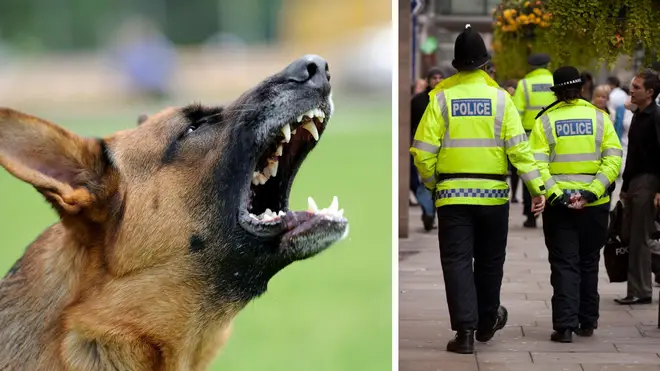
Paul Brand 10am - 12pm
20 July 2023, 08:22 | Updated: 20 July 2023, 13:26

Police in England and Wales are being forced to destroy at least two dogs a day after seizing them following savage attacks, LBC can reveal.
Latest data from 30 of the 44 forces, obtained by LBC, shows officers destroyed 769 out-of-control dogs who attacked people, including children, in the year to May 2023.
That has risen by a third on the previous year, when police seized and destroyed 506 dogs which had set upon human beings.
Separately, the Metropolitan Police seized 1159 dangerous dogs in London in 2022 – a rise of 32% on the previous year.
Dangerous dog incidents have soared by more than 50% in the last five years, according to South Yorkshire Police, who’ve expressed concerns about the number of cases involving the American XL Bully breed.
The force said the breed accounted for 25% of all dogs it seized in January last year.
Assistant Chief Constable Dan Thorpe said: "A woman in South Yorkshire bought two XL Bully dogs, believing them to be gentle giants. Those dogs turned on her in her home and caused fatal injuries".
A spokesperson for the Dogs Trust said research had shown that "no breed of dog is more likely to be aggressive than another".
Read more: Girl, 7, rushed to hospital after attack by 'XL bully' forces cops to seize animal
Read more: Shocking moments before police Taser violent dog and shove it in a wheelie bin
The National Police Chiefs’ Council has established a Dangerous Dogs Working Group, which was restructured two years ago to ensure dedicated police officers are focusing on dangerous dogs and dog attacks in every region of the country.
The group’s lead, Deputy Chief Constable Robert Carden, said: "As a result of this focus, we have seen an increase in the number of people reporting dangerous dog related incidents to police."
He added: "We are aware that incidents can often be very alarming to members of the public who witness them, but I want to reassure people that we are taking the matter seriously and we are cracking down on those who own or breed dangerous dogs.
"We continue to ask members of the public who know of dangerous dog ownership to contact police on 101 or in an emergency always call 999."
An investigation is underway by the NSPCC, Defra, local authorities, and animal welfare organisations aimed at reducing dog attacks.
The Responsible Dog Ownership Project is due to report back later this year.
Leading vets have blamed the “pandemic puppy phenomenon” for an alarming rise in dog attacks across the UK.
The President of the British Veterinary Association, Malcolm Morley, told LBC that many of the dogs bought during Covid lockdowns hadn’t been properly trained, and were now showing signs of aggression.
Mr Morley said: “There is undoubtedly a recent rise, which is really tragic for the people caught up in this.“Much of this is to do with the pandemic puppy phenomenon. During the pandemic, new people got dogs who weren’t long-standing dog owners, there was a lot of irresponsible breeding.
“There was really poor socialisation of dogs, who, like us, were isolated from having contact with other people and dogs. There was limited access to dog training, and that is one of the really key factors we believe is fuelling this.”
Research by the BVA found half of UK vets have reported a rise in the number of clients concerned about their dogs’ increasingly aggressive behaviour, in the year to May 2023.
It also found 87% of these dogs were believed to be under three years of age, highlighting the longer-term impacts of the pandemic on puppies bought during lockdown. Almost 1 in 4 (24%) of vets also reported an increase in the number of pets they had treated in the last 12 months who were injured as a result of aggressive behaviour by dogs.